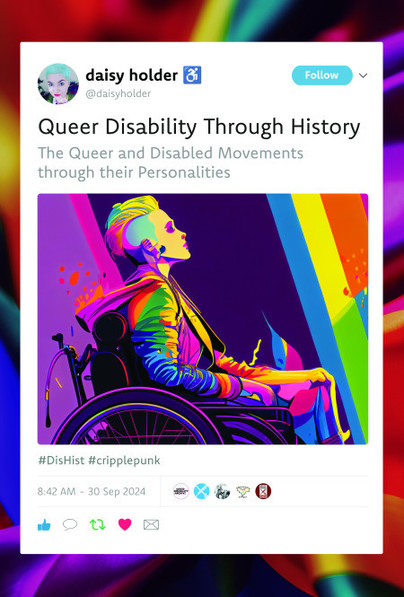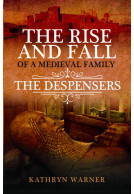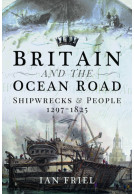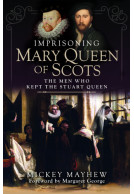Queer Disability through History (Hardback)
The Queer and Disabled Movements through their Personalities
Imprint: Pen & Sword History
Pages: 248
Illustrations: 24 mono illustrations
ISBN: 9781399050579
Published: 11th November 2024
(click here for international delivery rates)
Need a currency converter? Check XE.com for live rates
| Other formats available - Buy the Hardback and get the eBook for £1.99! | Price |
|---|---|
| Queer Disability through History eBook (1.5 MB) Add to Basket | £6.99 |
Persecuted, outlawed, imprisoned, shunned. You might think this refers only to the LGBTQ+ community, but their experience is remarkably closely aligned to the experience of the Disabled community.
This book examines the histories of these two movements are they ran alongside each other often intersecting. Both the Disabled and the LGBTQ+ movements have rich and intriguing pasts that date back beyond recorded history. As Holder explores the journey of these movements the journey highlights their shared history through the stories of the people who brought both into modern consciousness. They represent vital landmarks in the little-explored intersections between the two groups’ past and present.
Turn-of-the-century Mexican bisexual painter, Frida Kahlo, was Disabled by both polio and injury; Michelangelo turned his artistic talents toward homoerotic poetry to manage his arthritis. The iconic Marsha P Johnson lived with and cared for those with AIDs, and Dr Fryer, the psychiatrist with depression, has been credited with planting the seed that led to the removal of homosexuality from the American diagnostic manual of mental disorders. While many of these events seem small, they shape our Queer and Disability cultures and shared history, to show just how far we've come and how far we still have to go.
Gives two groups traditionally overlooked and stigmatized by history and society—people with disabilities and queer people as well—and lets them have center stage. Who knows what great stories we’ve missed out on, due to history’s longstanding obsession with dead statesmen to the exclusion of everyone else?
NetGalley, Jenny Mingus
Queer Disability through History is a valuable contribution to the field of disability studies and queer theory. It offers a nuanced perspective on the complex experiences of individuals who have been marginalized due to both their sexual orientation and physical or mental impairments.
NetGalley, A Be
Rating: 5 out of 5 stars
NetGalley, Ivan Langen
This opened my eyes.
Of course I know disabled people existed. I obviously know queer people existed. And yeah then logically queer disabled people existed too. But this book giving me many examples of wonderful people made it so much more real. It gives examples of people further back into history, and others who lived not that long ago. It gave me a big idea of us being there in all ages of time, and that was really nice.
I felt connected with history through this book in a way I only once had before with Queer as Folklore which I reviewed a few weeks ago. Both books take a look at historical queer things and it really gave me space to exist. Queer Disability Through History gave me even more a connected feeling though because disability is such an essential part of me and that intersection gives life a very different outlook. I loved that the book talked about this intersection too, how queerness can sometimes act as a disability, or how queerness and disability together give someone a significantly higher chance of discrimination. The look at both of these marginalizations together and how they interact through history gave me a lot more insight how this can be for others.
The book stayed down to earth but professional throughout. It felt respectful to the deceased and handed it with care. It was interesting to learn about so many individuals, some of whom I'd heard from before and others who I didn't. It highlighted a few big moments in both queer and disabled history and showed someone disabled and queer who had a big hand in that. These highlights were really awesome and gave me a lot of insight.
I would recommend this book to anyone wanting queer and disability history in a fun way.
An enjoyable and informative book. There were a range of individuals discussed - both ones I had heard of and ones that I hadn't. Out of those that I had heard of before, there was a ton of information about them that I was unaware of. The book does a solid job of putting the individuals and their experiences into a greater context as well. Even as someone who has read about/engaged with disability advocacy for some years now, there were sections that helped me grasp areas of theory better than previously.
NetGalley, Nick Aucoin
Starting off, I loved that the book included a definition for disability at the beginning that was widely inclusive. It is such an interesting premise to dive into history through specific queer Disabled peoples’ lives! Immediately, they touch on how queer Disabled peoples’ identities are often separated into “queer” or “Disabled”, but both aspects are rarely examined together. They also mentioned how their own coverage of the issues may be biased and I appreciated how the author confronted their own biases this way. They did a wonderful job weaving in a lot of basic queer and disabled history to fill out the stories that this book told and it added some interesting context! All together, it made an enthralling read about disabled queer history!
NetGalley, Sarah Loyd
Rating: 5 out of 5 stars
NetGalley, Jade Husdan-Hicks
This is an amazing book that focuses on The intersections between several groups, but predominantly those with disabilities that are also lgbtqia+.
Covering topics from Guardianship, Ethics in care, access issues and more it is a definitive guide to understanding these groups intersecting history and I feel should be a mandated read for all.
>From platforming icons both known and previously unknown (at least to me) for their contributions to policy, societal change, pride as we know it and so much more it is a fountain of knowledges.
Additionally it highlights Impacts on those in several minorities ie queer and disabled or BIPOC/and disabled.
One event which particularly stuck out to me was the Capital crawl. This being as it was such a visual and un-ignorable representation of the community and the need for Policy around queerness and disabilities to change to better protect them.
This includes fighting against past DSM psychotherapy definitions on homosexuality and transgenderism and ADA policy failing protecting those who were intersectional.
>From Deafness to chronic illness, To those disabled by events we see a broad range of disabilities and identities represented and it has an intersection with art as well as policy.
Rating: 5 out of 5 stars
NetGalley, Jax Davis
This is genuinely a must read. It talks about important queercrips in history and their importance but also connects it with other, queer and/or crip, history. As a queercrip who has talked about historical queercrips in the past, this anti-erasure book gave me so much joy.
Rating: 5 out of 5 stars
NetGalley, Lauren B
This was a really poignant and important read. The way the author structured this book lead the reader through the intersection of disability and queerness -which has not previously been really talked about together even though the term intersectionality has been coined for a while. I liked how the author started with more famous queer folks - Frida and Marsha - and then expanded with other figures that might not have been well known in either the disability or queer communities but are now more understood. This is a great book for anyone who wants to learn more about queer or disability history (and will learn about both).
About Daisy Holder
Daisy Holder is a researcher, writer and archivist who specialises in disability history. Their work has focused on making disabled people's stories accessible to the community; online as well as in magazines, podcasts, books and museums. Daisy is a skilled communicator of the past and a passionate advocate of archiving and preservation, having set up Disability History Snapshots and the Covid Disability Archive and worked on numerous projects to raise awareness of disabled people's history and spread knowledge among the community. Born and raised in the west country of the UK, they can often be found playing social deduction games, crocheting and dressing as a 1990s Children's TV presenter, usually all at the same time.















